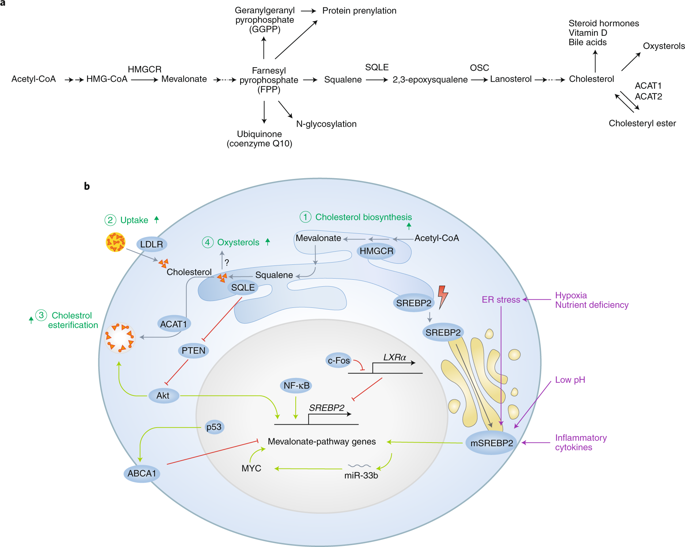Nature Metabolism ( IF 18.9 ) Pub Date : 2020-02-10 , DOI: 10.1038/s42255-020-0174-0 Binlu Huang 1 , Bao-Liang Song 2 , Chenqi Xu 1

|
Cholesterol metabolism produces essential membrane components as well as metabolites with a variety of biological functions. In the tumour microenvironment, cell-intrinsic and cell-extrinsic cues reprogram cholesterol metabolism and consequently promote tumourigenesis. Cholesterol-derived metabolites play complex roles in supporting cancer progression and suppressing immune responses. Preclinical and clinical studies have shown that manipulating cholesterol metabolism inhibits tumour growth, reshapes the immunological landscape and reinvigorates anti-tumour immunity. Here, we review cholesterol metabolism in cancer cells, its role in cancer progression and the mechanisms through which cholesterol metabolites affect immune cells in the tumour microenvironment. We also discuss therapeutic strategies aimed at interfering with cholesterol metabolism, and how the combination of such approaches with existing anti-cancer therapies can have synergistic effects, thus offering new therapeutic opportunities.
中文翻译:

癌症中的胆固醇代谢:机制和治疗机会。
胆固醇代谢产生必需的膜成分以及具有多种生物学功能的代谢产物。在肿瘤微环境中,细胞内源性和细胞外源性提示会重新编程胆固醇代谢,从而促进肿瘤发生。胆固醇衍生的代谢产物在支持癌症进展和抑制免疫反应中起着复杂的作用。临床前和临床研究表明,控制胆固醇的代谢会抑制肿瘤的生长,改变免疫状况,并增强抗肿瘤免疫力。在这里,我们回顾了胆固醇在癌细胞中的代谢,其在癌症进展中的作用以及胆固醇代谢物影响肿瘤微环境中免疫细胞的机制。我们还将讨论旨在干扰胆固醇代谢的治疗策略,











































 京公网安备 11010802027423号
京公网安备 11010802027423号